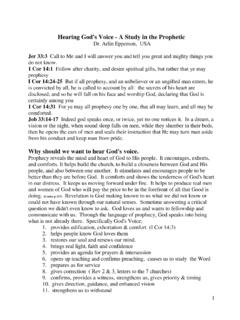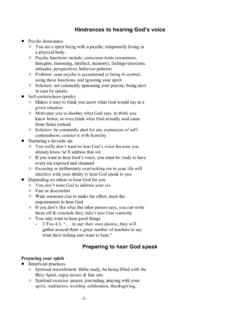Transcription of HEARING GOD’S VOICE - Aslan's Place
1 HEARING GOD S VOICE Table of Contents Old Testament Prophets .. 2 New Testament Apostles .. 3 Why the name apostle instead of the name prophet? .. 4 The Promise of Latter Day Prophets .. 5 There Can Be False Prophets .. 5 New Testament Prophets - Corinth .. 5 New Testament Prophets-Rest of New Testament .. 6 Characteristic of the Prophetic .. 7 How God Speaks .. 8 Nine Purposes of Prophecy .. 10 Make Up of a Prophetic Word .. 10 Judging Prophecy .. 10 Pitfalls of Prophecy .. 10 10 M's for Maturing and Maintaining Ministry and Discerning True and False 11 The Timing of Prophecy .. 12 Practical Applications .. 13 Interpreting Dreams.
2 16 Some Reasons Why God May Not Speak .. 16 The Kind of People Who Hear God s 16 The gift of prophecy is the special ability that God gives to certain members of the Body of Christ to receive and communicate an immediate message of God to His people through a divinely anointed utterance. (The Third Wave of the Holy Spirit - C. Peter Wagner) Prophecies are spoken to strengthen, encourage, and comfort the Body of Christ (I Cor. 14:3). The central purpose of prophecy is edification (I Cor. 14:4). To speak prophetically is to speak by divine inspiration. It is the presentation of God s message for an individual, group, nation, or generation.
3 It may bring direction, correction, warning, encouragement, or instruction, but one thing is for certain: it will always direct the recipients to the heart and ways of God. 1 It is interesting to note no one would ever find their way to Jesus without direct, supernatural revelation. 2 At the time of the first coming many were told that Jesus would come even though there had been scriptural revelation given in the Old Testament. The first mention of prophet in Scripture is in Genesis 20:7. The Hebrew word is nabi, and appears more than 300 times in the Old Testament. The second reference is in Exodus 7:1. Based on these two passages, a prophet is one who speaks for another, or one who lends his VOICE to another.
4 See also Deut. 18:18, John 12:49, Hebrews 1:1-2, I Peter 4:11. The concept of a prophet as only a foreteller of the future is erroneous. Old Testament Prophets Prophets are messengers of God. Haggai 1:13: Then Haggai, the Lord s messenger, gave this message of the Lord to the people: I am with you, declares the Lord. Jer. 28:9: But the prophet who prophesies peace will be recognized as one truly sent by the Lord only if his prediction comes true. True prophets are those sent by God. A messenger does not carry his own authority. He speaks with the authority of the one who sent him. The Prophets words are words of God.
5 Ex. 4:12: Now go; I will help you speak and will teach you what to say. 1 Thus Saith the Lord 2 Deere, Jack. Surprised by the VOICE of God. Deut. 18:18: I will raise up for them a prophet like you from among their brothers; I will put my words in his mouth, and he will tell them everything I command him. Jer 1:9: Then the Lord reached out his hand and touched my mouth and said to me, Now, I have put my words in your mouth. Num. 22:38: Well, I have come to you now, Balaam replied. But can I say just anything? I must speak only what God puts in my mouth. Ezek. 2:7: You must speak my words to them, whether they listen or fail to listen, for they are rebellious.
6 There is absolute divine authority of prophetic words. To disbelieve or disobey a prophet s words is to disbelieve or disobey God. Deut 18:19: If anyone does not listen to my words that the prophet speaks in my name, I myself will call him to account. I Sam 8:7: And the Lord told him: Listen to all that the people are saying to you; it is not you they have rejected, but they have rejected me as their The words of a true prophet are beyond challenge or question. I Sam 3:19: The Lord was with Samuel as he grew up, and he let none of his words fall to the ground. I Sam 9:6: But the servant replied, Look, in this town there is a man of God; he is highly respected, and everything he says comes true.
7 Let s go there now. Perhaps he will tell us what way to take. In contrast, if what a prophet proclaims in the name of the Lord does not take Place or come truce, which is a message the Lord has not spoken. That prophet has spoken presumptuously . (Deut 18:22). New Testament Apostles New Testament apostles: Speaking God s Very Words. There is little if any evidence for a group of prophets in the New Testament churches who could speak with God's very word, with divine authority. However, the apostles do speak with absolute divine authority. The apostles are messengers of Christ. They were commissioned by Christ, sent by him on a specific apostolic mission, just as the Old Testament prophets were sent by God as His messengers.
8 The apostles words are words of God. (Gal 1:11-12, 2 Peter 3:2, I Cor. 2:13, 2 Cor 13:2, 3, I Thess 2:13, I Thess 4:8, I Thess 4:15) Therefore to disobey the apostle is to disobey God 2 Thess 3:14. I Cor. 14:37-38: If any one thinks that he is a prophet, or spiritual, he should acknowledge that what I am writing to you is a command of the Lord. If anyone does not recognize this, he is not recognized. Thomas Edwards writes: He that refuses to hear Christ s apostles refuses to hear Christ himself and incurs His displeasure. The apostles have authority to write words which are God s own words, equal in truth status and authority to the words of the Old Testament.
9 Why the name apostle instead of the name prophet? Joel 2:28-29 stated that God s spirit will be poured out on many people who will become prophets. Therefore the term of prophet would be too broad of term to apply to a limited number. In secular Greek (at the time of the apostles) the everyday term prophet meant one who has supernatural knowledge or one who predicts the future, or just spokesman. The word carries with it no suggestion that this person would speak for God. The Jews during the time of the apostles saw a prophet not as one who spoke for God, but sometimes as a person who simply has knowledge of things beyond his perception.
10 According to Rabbi Hanna B. Isaac, If one rises early and a Scripture verse comes to his mind, this is a small prophecy. Again in this context, there is no sense of absolute divine authority. The women at the well told Jesus she perceived he was a prophet, yet all He did was reveal that he had information that came from no ordinary source. The word Apostle is a suitable substitute for the idea of the Old Testament prophet. An Old Testament prophet was sent by God. The word Apostle means sent one or messenger . Since apostolos was a new term it could be used of a limited group of men without seeming to conflict with any Old Testament or rabbinic expectations of a wide distribution of prophetic abilities.









